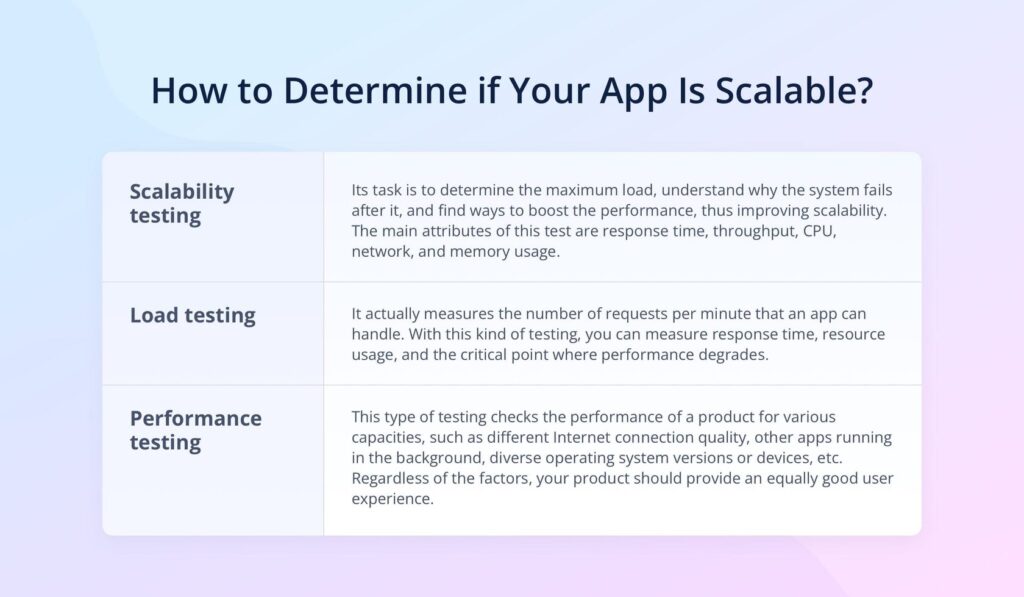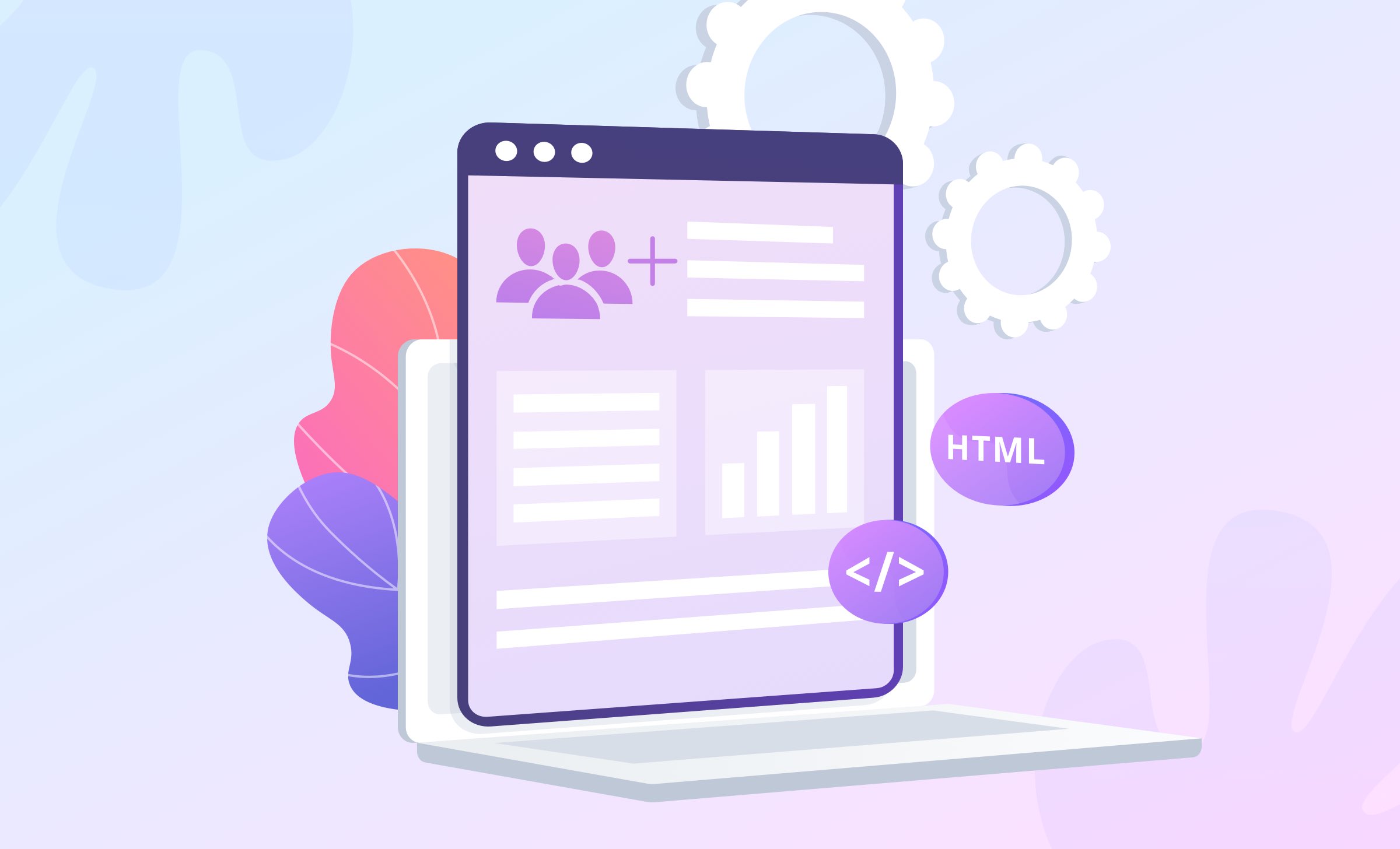When you start any business, you hope that it will succeed and expand over time. The same applies to mobile apps. You expect it to become popular, in demand, and outperform competitors in many respects. At first, the success might not be so impressive, but marketing and optimization will do their job in the future. It is vital to get ready for such growth at the start of work and think of mobile app scalability in advance.
Scalability is a critical parameter that determines whether your system can withstand a sudden increase in popularity and load. If you don’t prepare for the rapid rise in traffic and user numbers, you risk losing customer interest and money. To prevent this from happening, read our material on this topic. In the article, we will tell you more about the term “scalability,” what benefits it brings to your business, and how to understand if your app is ready for an increase in load.
Table of Contents
What Does Mobile App Scalability Mean?
The term “scalability” can be applied to any system. It means the capability of a service to withstand a sharp increase in load. But what is app scaling? In the case of mobile apps, it could be a system’s capability to stay stable after increasing the number of active users or introducing new features. To handle the load and not crash, your servers and backend must be prepared for such surprises as boosted requests per minute. Your product should work equally stable for any number of customers.
Reconfiguring the product to new conditions can take time, during which you risk losing some users. As statistics and analysis of the increase app conversion rate show, poor performance and crashes are something that can really turn off customers because no one wants to deal with slow systems. To avoid investing in user acquisition again, you should think about building mobile apps at scale from the very beginning.
What Are the Benefits of Building Mobile App Scalability?
Developing an app is a complex process, so you want to make sure your product performs great in the long run as your business grows. Therefore, you should consider app scaling at the stage of building the architecture. That way, you can get the most out of it. Here is just a small list of the benefits that this approach can bring you.
- High-quality UX
Scalability allows you to deliver the best experience to your customers, no matter how many or how active they are. It is one of the components of success and competitiveness. If users have a smooth-running, high-performing product, they will have no reason to go to competitors that offer similar functionality.
- Saving money
Poor performance leads to the churn of customers, which consequently leads to loss of money. For your app store revenue estimates to live up to expectations, you need to migrate your basic MVP that started it all to higher quality infrastructure. This way, you can keep the public’s interest and the momentum that got your success started.
- Stable work
It is difficult to predict the growth in the number of active users for sure. That is why your app should be ready for changing workloads and meet scalability requirements. So you can be sure that the product works stably with any traffic, including during holidays or marketing campaigns when customer interest sharply rises. A weak infrastructure simply cannot withstand such surges.
- Flexibility
As your business grows, your goals and objectives might change. Scaling mobile apps from the very start will allow you to modify your products depending on the current situation without any issues. Such a flexible system will also allow you to change the app based on user feedback and add those elements that are currently in demand without worrying about infrastructure overload. By the way, scalable systems are easier to hand off to a new development team if such a need arises in the future.
- Positive reviews
A high-quality and stable product is the key to a high rating and positive user reviews. No matter how good ASO keyword research work you did, if your app doesn’t run smoothly, people will abandon it. More positive reviews give you more attention from new customers, which leads to more revenue.
- High profit
If you manage mobile app scalability issues, then it will be easier for you to increase your income. You’ll also be able to run campaigns and sales more frequently and get the most out of promotions like Black Friday and big holidays like Christmas without fear of technical issues. To attract customers’ attention, you can use ASO and SEO to the fullest by talking about your new in-app events in preview videos. In our ASO blog, you can read more about app preview videos.
All this ensures your long-term success and guarantees a higher return on investment. We think all the arguments listed above are powerful enough for you to stop asking, “Why is mobile app scalability important?” and start thinking about how to improve your product.
How to Determine if Your App Is Scalable?
For this task, you can carry out various kinds of tests, which check the operation of your system at different levels: database, hardware, and software.

All this allows you to deeply assess the capabilities of your structure and identify its weaknesses even before the app falls into the hands of the mass users.
Plan for Scalability From the Start
The mobile app scalability is something you should think about very early in the development process. Since the success of your business largely depends on it, try to answer the following questions:
- What increase in customers do you expect to receive during the year?
- For how long can you use one server?
- Is your data storage plan flexible enough?
- How can the app performance be improved as the load increases?
By answering these questions and preparing for the surge in customers in advance, you can create a smooth-running product that won’t crash at the slightest increase in traffic. It is especially important if you choose the no-code option.
Not all providers offer scalable systems, and many of them have certain limits. So either develop a mobile app scalability with your own developers or make sure your provider offers a flexible enough zero-code platform. The described tests will help you determine the so-called saturation point and take the product beyond its limits to satisfy the needs of your growing audience.


